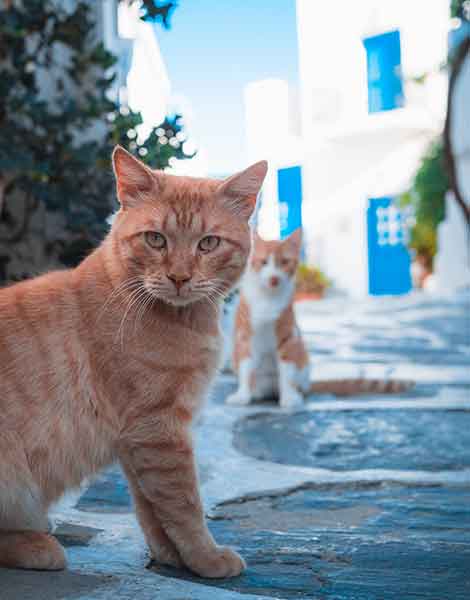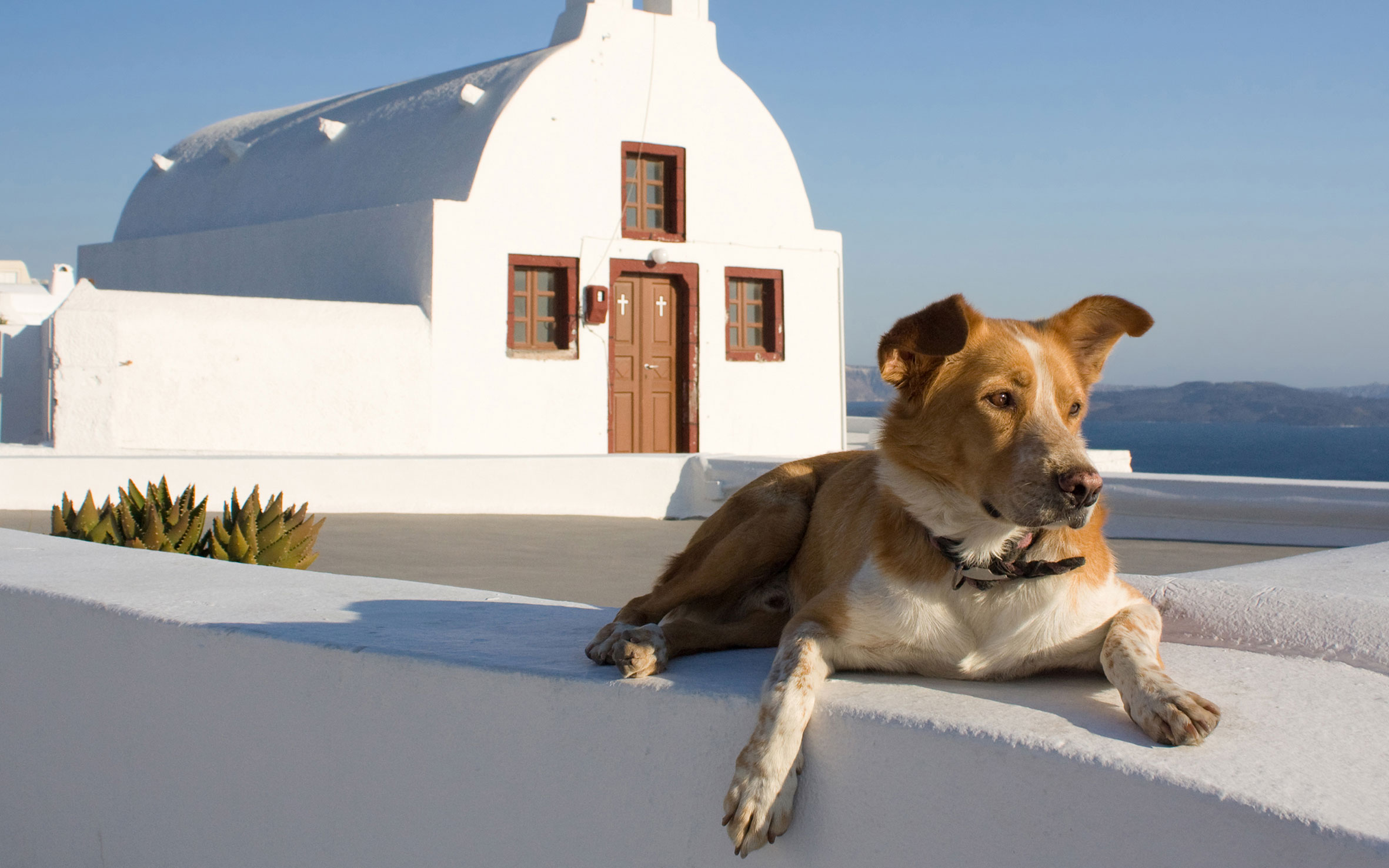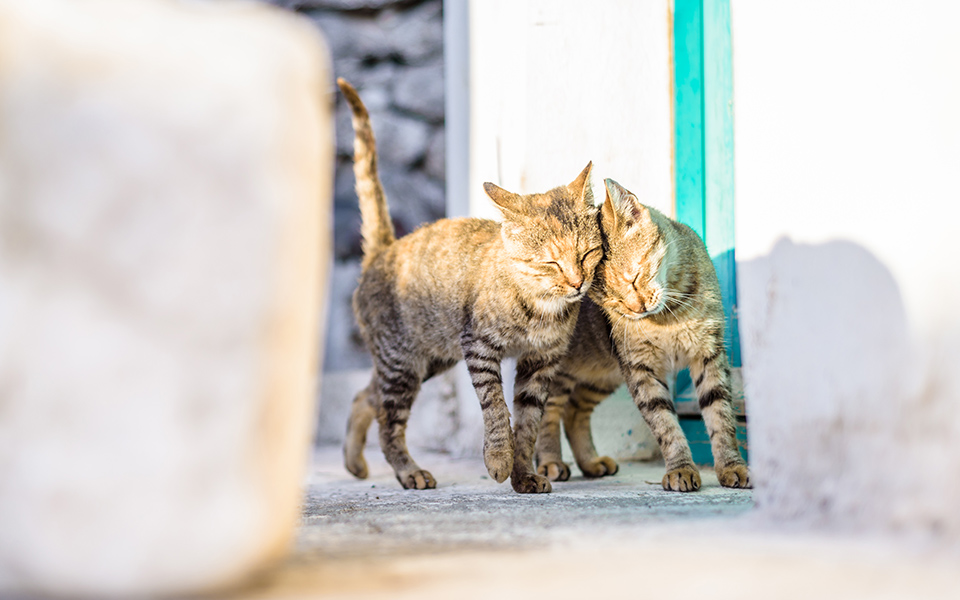Don't shop, adopt! There are countless stray cats and dogs in Greece in desperate need of a safe, loving home. Here's how you can help.
It’s no secret that Greece has a serious problem with stray cats and dogs. In fact – and to our perennial shame – the country has one of the largest stray feline and canine populations per capita in the world, with as many as two million (!) cats and dogs on the streets of Athens alone, according to local animal rights activists.
While this staggering number is partly due to years of economic crisis, other factors, including insufficient spaying and neutering programs, a lack of awareness about responsible pet ownership, and dyed-in-the-wool cultural attitudes towards animals, have also played their part. After all, the concept of keeping a pet is still relatively new in Greece. In the not-too-distant past, when the majority of the population lived in rural communities, animals had a purpose – to work on the farm, to keep pests and vermin under control, to hunt, to herd, and so on. When it was no longer useful, it was not uncommon for the animal to be simply abandoned or killed.

Greece's stray animal problem has been exasperated by years of economic crisis.
© Shutterstock
But it’s not all doom and gloom. In recent decades, a vast network of largely volunteer-based animal welfare charities have sprung up around the country, devoted to the care and treatment of stray animals. The Greek government, too, in collaboration with local municipalities, has worked hard to bring the issue of animal welfare into sharper focus and provide more funding for better infrastructure. New legislation, with criminal sanctions coming into effect from September this year, will impose hefty fines and custodial sentences on those convicted of animal cruelty, and, to get a grip on the vast numbers of strays, a strict policy of microchipping and sterilization is already underway. While the latter is somewhat controversial, notably among pedigree dog breeders, the move has been welcomed by animal welfare associations across the country.
On a local level, municipalities are providing better care for strays in pounds, providing veterinary services, encouraging the participation of volunteers at shelters, and promoting the adoption of animals on social media platforms. In the case of Athens, where the problem is particularly acute, the municipality (website in Greek) is also covering some of the expenses related to adoption, including vaccinations, microchipping, neutering/spaying, and the cost of food for the first few months, enabling more and more people to give a stray cat or dog a loving home.
If you live in Greece, and adopting a stray is something you’ve long considered but haven’t gotten around to doing yet, read on. In this guide, we’ll outline what you need to do to give a Greek stray a much-needed second chance in life, the various steps you’ll need to take, and the contact information of some of the country’s leading animal shelters. If you’ve come to Greece on vacation and you want to take a stray home with you, the process is still relatively straightforward, but will require a bit more paperwork.

Efforts are underway to sterilize and microchip all stray animals in Greece.
© Shutterstock
Adoption saves animals
While government-backed neutering programs aim to curb the proliferation of Greek strays, there’s little doubt that adoption is the best way to get the animals off the streets and into homes.
The good news is that cultural attitudes towards stray animals in Greece are shifting, especially among the younger generations. People are more aware of the situation and want to be part of the solution. After all, travel and tourism in Greece accounts for nearly 20 percent of the economy, and the sight of large numbers of strays in public spaces can be off putting to some visitors, tarnishing the country’s reputation abroad.
“It is time for Greece to go forward with courageous steps for the protection of our little friends,” Greek prime minister, Kyriakos Mitsotakis, said in 2021. “Animal protection is a matter of civilisation.” Leading from the front, the prime minister and his family famously adopted a rescue puppy, “Peanut,” on the occasion of the International Day of Stray Animals (April 4).

What's new pussycat?
© Shutterstock

Look into my eyes ...
© Shutterstock
The process to adopt a stay cat or dog in Greece is more-or-less same. You’ll need to follow these general steps (a list of the main animal adoption organizations follows below):
1. Reach out to animal shelters, rescue organizations, or animal welfare groups in your local area and inquire about the adoption process. Many organizations will have websites or social media pages that include photos and profiles of strays that are available for adoption. Remember: adopting a puppy or a kitten, as opposed to a much older animal, will present its own set of challenges. Think about what you’re able to provide in terms of time for exercise and play, and the nature of your own living space (if you’re precious about your things, take heed! Teething puppies will gnaw on wooden furniture and some cats will shred long curtains).
2. If you decide to go ahead with an adoption, you will need to fill out an application form. This will ask for your personal information, living situation, and experience with pets. Some organizations may conduct an interview or even arrange a home visit to assess the suitability of your home for the animal’s needs. This step ensures that it will be going to a safe and caring environment.
3. Inquire about adoption fees. If you’ve been given approval, some shelters and rescue organizations may ask for an adoption fee to help cover the costs of veterinary care, vaccinations, microchipping and neutering/spaying (all mandatory), although, increasingly, municipal authorities are stepping up with those expenses. The fees may vary depending on the organization and the animal’s age, health, and other factors. Finally, you will be asked to sign an adoption agreement or contract.
4. Pet-proof your home. Prior to bringing your new cat or dog home, ensure that you have all the necessary supplies such as food, water bowls, bedding, toys (a litter box and scratching posts for cats), and a secure area for the it to sleep and play. Give them time to adjust to their new environment and bond with you. Provide a quiet and secure space, introduce them gradually to other family members or pets, establish a routine (essential for dogs), and offer plenty of love, patience, and positive reinforcement.
5. Provide veterinary care. Take your newly adopted pet to a veterinarian for regular health check-ups. The shelter or organization will provide you with all the necessary information about the the animal’s medical history.
By following these steps, you can give a stray animal in Greece a second chance at a loving home. Remember that each organization may have specific requirements and procedures, so it’s important to reach out to them directly for detailed instructions on their adoption process.

The adoption process in Greece is relatively straightforward, and aims to get as many strays off the streets as possible.
© Shutterstock
If you live abroad
If you’ve come on vacation to Greece and fallen head over heels in love with a stray, you will need to take it to a local vet for a comprehensive medical check, vaccinations, and, most importantly, a pet passport, if you want to take it home with you. If you’re adopting the animal from a shelter or rescue center, they will assist you in the process.
Contact your airline as soon as possible to inquire about travel guidelines for pets and animal safety. Some airlines allow pets to travel with their owners in the main cabin, while others may treat the animal as cargo. In both cases, you will need to purchase an extra ticket for your new furry friend.
Call your country’s embassy or visit their website to ensure you haven’t missed anything. Inquire about quarantine and about all the necessary documentation (import papers, for example). Double-check the requirement for vaccinations. Countries like the United States and the United Kingdom require mandatory rabies vaccinations prior to entry, while Australia has strict rules concerning microchips.
At the end of the day, if you cannot take a Greek stray home with you, do consider supporting an animal welfare charity by donating money and/or following their work on social media. Some organizations provide virtual adoption programs, inviting supporters to contribute to the cost of food, medical care and toys for one of the animals at their shelter. Why not virtually adopt a Greek stray on behalf of one of your friends or family members? It’s the perfect gift for any animal lover!

If you can't take a Greek stray home with you, consider supporting an animal welfare charity instead.
© Shutterstock
Charities
This list of animal adoption organizations in Greece is by no means exhaustive, but it will get you started. Please note that there are many, MANY more animal shelters in Athens and around Greece in need of support. Click on the following links for contact details:
Friends of the Strays of Greece – A UK charity, registered in 2002 by Lyn and Mark Purden, that supports animal welfare groups in Greece to provide food, shelter and veterinary care to stray cats and dogs. The website is a veritable mine of information, including a comprehensive section on adoption.
Dogs’ Voice – An Athens-based association that’s on the front line of caring for stray dogs in the Greek capital. The website, which is in Greek, has a database of dogs that are up for adoption.
Nine Lives Greece – A highly dedicated network of Greek and expat volunteers dedicated to the reduction of the stray cat population in Athens. They also try to find homes for cats and kittens picked up by the charity.
A Little Shelter – Founded in 2020, A Little Shelter provides temporary accommodation for stray cats and dogs in Athens. The shelter assists with medical treatments, sterilizations, and adoptions. Their website is in Greek.
Compassion for Greek Paws – A fast growing shelter and rehoming center in northern Greece, currently caring for more than 100 stray dogs. Founded in 2015 by Amanda Jane Maguire Deligianni, this organization is especially adept at the adoption process from Greece to the UK, assisting with paperwork and travel.
Navarino Pet Community – Founded by a team of volunteering associates in Messinia, southwest Greece, the Navarino Pet Community currently hosts 20 dogs of various ages seeking adoption. All dogs have been sterilized and microchipped.
Save a Greek Stray – A fantastic Greek non-profit whose volunteers tirelessly work to provide a safe and loving environment for stray cats and dogs. The organization also runs education programs to promote responsible pet ownership and training. Their website, in Greek and English, hosts a comprehensive database of animals seeking adoption, with photographs and profiles.
In the words of Erietta Kourkoulou-Latsis, founder of Save a Greek Stray: “We are not alone on this planet. We must learn to respect all forms of life, because every life matters.”









